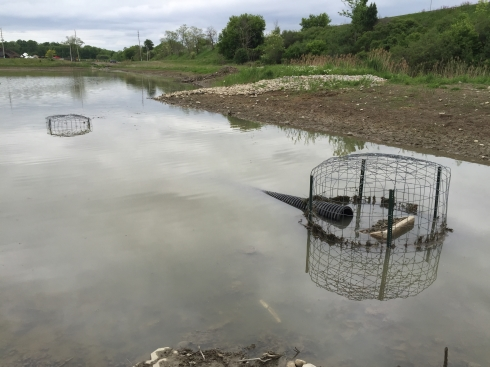(Every year, Dr. Roly Armitage who recently passed away, would pay tribute to the importance of beavers in our local wetlands with a Canadian flag proudly displayed on a beaver lodge. Photo: Ottawa-Carleton Wildlife Centre)
Dr. Roly Armitage, a beloved and celebrated icon paid tribute every year to another Canadian icon, the Beaver, by flying a flag over its lodge in a Dunrobin wetland.
Roly, who passed away last week, would be proud that a fellow West Carleton citizen, Councillor Clarke Kelly, is picking up the mantle to keep beavers and their remarkable environmental services on the landscape.
Tomorrow, City Council, will consider a number of motions that were approved last week at a Joint Meeting of the Agriculture and Rural Affairs and Environment and Climate Change Committees on the City’s Wildlife Strategy.

Among these motions, several are critical. Councillor Clarke Kelly’s motion brings the prospect for a more enlightened approach to beavers. It is something that wildlife, environment, conservation and community organizations have fought on behalf of for more that a decade.
“People are appalled that the City of Ottawa kills 150 beavers a year. It flies in the face of modern science and the growing number of communities across North America that are using flow devices to benefits from the essential services beavers provide”, said Donna DuBreuil, president of the Ottawa-Carleton Wildlife Centre.
London, Ontario has been installing flow devices in its stormwater infrastructure for nearly a decade and, it all of this time, has only had to trap 2 beavers. Compared to Ottawa that traps 150 beavers a year, London has been able to keep almost all of its beavers working on behalf of the environment, while Ottawa has “removed” 1500 beavers over the same period due to its unwillingness to use flow devices. It’s no wonder Ottawa’s wetlands are dying.

Residents from across Ottawa, including the dozen or so delegations that spoke at the Joint Meeting, expressed frustration with the City’s regressive wildlife practises and outdated environmental policies, calling on City Councillors to provide the leadership needed to change course.
Councillors are listening and taking the lead.
Councillor Riley Brockington has committed to a “Wildlife Strategy that reflects modern day practices to coexists with wildlife in our City.” Demonstrating that commitment is the proposed service agreement with Coyote Watch Canada to assist in instances of human-coyote conflicts with investigation, education, prevention and enforcement.
Councillor Clarke Kelly’s motion on changes to beaver management includes the creation of an inventory of beaver conflict sites and alternatives for each; a summary of the costs for the current program, i.e. staff time/salary, overtime, equipment and expenses re contracted service providers; a public forum to bring together flow device experts as well as a municipality with a proven track record of using these devices with City staff and City’s Drainage Engineers; a flow device expert to analyse the results of the inventory of existing drains and watercourses, review current practices for beaver management and provide recommendations on an approach that integrates flow devices as a beaver management tool for Stormwater Systems based on respectful coexistence.

Councillor Laine Johnson’s and Councillor Marty Carr’s motion address governance and the public demand for community input, oversight and accountability.
The motion proposes that the (new) Wildlife Resource Specialist review the membership, scope and objectives of a Department-led Working Group, including the potential participation of representatives from other levels of government, non-governmental agencies and Councillor Liaison(s).
This initiative will determine the outcome and success for meaningful collaboration between city staff and community stakeholders.
Rebuilding trust will require openness and transparency and, most important, result in clear actions within the community that benefit wildlife and the public.
“We are hopeful that Ottawa residents will finally get to see the modern Wildlife Strategy they have been urging for years. That hope is based on the commitment and the concrete steps being taken by Councillors towards positive change”, said DuBreuil.









KEEP UP THIS GOOD WORK.
This is a very uplifting article. Thank you to the councillors who moved this forward and to those who support the changes.
So happy to hear that Dr Armitage’s devotion to this Canadian icon will continue. Thank you to those councillors who have taken the lead in supporting changes to maintain the beaver population in our city.